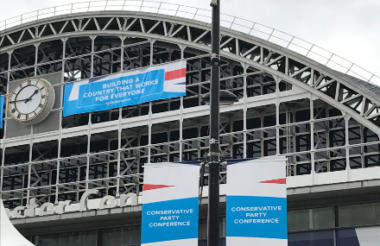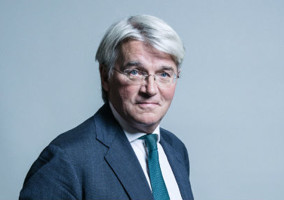Earlier this week Alice Sharman and Kirsty Weakley went to Manchester to hear what Conservatives said about charities and what charities said to Conservatives. Here are the highlights.
Social Enterprise as a vision for the Tories
At an event hosted by Social Enterprise UK the MP George Freeman, who organised a pre-conference event to boost grass roots support and come up with new ideas for the Tory party, said that the social enterprise movement was something that the Conservative Party should get behind.
“For those of us in the room who are Conservatives, we have a major challenge on our hands and the social enterprise sector goes right to the heart of solving 60 per cent of that – which isn’t bad,” he said.
But a member of the audience challenged the idea that the current system is broken. Gordon Gregory, who was the Conservative Party candidate for Sheffield Heeley at the last election, said that he thought the problem was just that "we haven't defended capitalism particularly well since the fall of the Soviet Union". He said he was "nervous about the narrative".
"It can be shown that capitalism has worked for the vast proportion of the world," he said.
Lord Adebowale, chair of SEUK, also told the event that social enterprises are different to charities and reiterated calls to move responsibility for the sector to the Department for Business, Energy and Industry.
Focus on international development
There were several sessions which considered the UK’s commitment to international aid and how it was delivered.
At one fringe event a representative from the Taxpayers Alliance called for the commitment to spent 0.7 per cent national income on aid on aid to be dropped. James Price argued that British people would give more money to charity if their tax bill was reduced.
However at other events the former and current International Development Secretaries, Andrew Mitchell and Priti Patel, said they were proud of the pledge.
Patel told the Save the Children reception that it shows that in Britain “We don’t turn our backs”.
Politicians also said that charities should be more transparent and also make a stronger case for the value of aid. And charities offered advice on the best way to support the sector.
During a panel discussion Adam Pickering, international policy manager for CAF’s Giving Thought programme, said the government needs to build civil society within countries it is supporting.
This would “create something more sustainable” he said and mean we “leave a legacy” in countries.
At the Save the Children reception, Kevin Watkins, chief executive of Save the Children, said that “transparency” and “value for money” were important and that it is “right for charities to be held to account for what we do”.
Politics is back in international aid
Kirsty McNeill, executive director of policy, advocacy and campaigns at Save the Children, told a fringe event on answering difficult questions about foreign aid that the biggest story of the last couple of weeks is that politics is back in international development.
She said: “We can see from the two party conferences that politics is back in international development. In a way I think is actually really healthy.”
Referencing Priti Patel’s speech, she said: “We’ve just seen an incredibly muscular speech from the secretary of state putting economic development right at the heart and soul of international development.”
McNeill said that although the Labour party and Conservative party have two completely different world views about aid, it is still “incredibly healthy that we are starting to have a debate about development”.
She said: “It has been off the table for about five years now, and the fact that politics is back is the real story of the last fortnight for me.
“But the reason I feel really pleased and happy about that is because we are now having a debate between parties on how we do development, not whether we do development.”
She added that it is a "tremendous testament to activism in almost all political parties that the British mainstream is not about whether we do it".
McNeill also said that it is good that there are debates in the media about aid, and that there shouldn’t be a “binary consensus”. But she Save the Children would be happy to take on myths about international aid when they arise.
Lobbying
Separately Mitchell criticised historical lobbying practices by charities and said government money should not be used for core costs.
Charities “should get core funding from their members” to be able to “go out and campaign”, he said.
But also speaking on the panel, Debbie Pippard, head of programmes at the Barrow Cadbury Trust, highlighted that part of the problem with the Lobbying Act and the anti-advocacy clause was the “signal coming from us” for developing countries.
‘It is embarrassing that we still exist’
During a panel to discuss solving homelessness and rough sleeping, the chief executive of Crisis, Jon Sparkes, said it was “embarrassing” that his charity still exists.
“We are 50 years old this year,” he said, but it “wasn’t a reason for a part or a reason for a large fundraising campaign. It is a reason to be embarrassed.”
He said the best legacy would be to be able to “plan our demise.
Sajid Javid, Communities Secretary, said the government was committed to ending homelessness.
“One person sleeping rough on our streets is one person too many,” he said. “It’s my personal mission, and I won’t rest until we have had a huge step change.”
Former MP Brooks Newmark, who authored a report for the Centre for Social Justice advocating a "housing first" policy, whereby homeless people are provided housing without conditions and also support to tackle other issues, said the policy should be rolled out as soon as possible.
“There is a disconnect between the will of the Prime Minister and the will of the Treasury,” he warned, and said this was because the way the Treasury works makes it hard to fund things that will save money in the future.
Bob Blackman, the MP who sponsored the Homelessness Reduction Act, which comes into force next year and means that local authorities will be obliged to offer accommodation to people, urged people to write to their MPs giving their support for a housing first approach.
Funding for charities
At a session looking at charity funding leaders discussed ways the government could encourage more investment in the sector.
Dame Helen Ghosh, director general of the National Trust said that the transition to new models needed to be done in “partnership with government”.
Duncan Shrubsole, director of policy and partnerships at Lloyds Bank Foundation, called on MPs to do more to champion small charities in Parliament and not just when they are out in their constituency.
At the same event Oonagh Aitken, chief executive of Volunteering Matters, called for a wider debate about the role of civil society and volunteering in delivering public services.
Debate over full-time volunteering
At a panel debate about full-time social action, organised by the Centre for Social Justice, Karl Wilding, director of public policy and volunteering, questioned whether expanding full-time volunteering projects should be a priorty for the government, when there are other things that can be done to encourage volunteering.
He said the evidence is that the way people choose to volunteer is “shifting” from longer hours to “shorter, more episodic and disjointed bits of time”.
“So is this going against the grain?” he asked.
But James Probert, director of impact & design at City Year UK, which has been piloting full-time volunteering programmes and campaigning for a new legal status for full-time volunteers, said that the reason there were so few at the moment was because it is really difficult to volunteer full-time in the UK.
He said evidence from other countries suggested that it could add “extra capacity in the voluntary sector” and suggested that there was a “lack of imagination” from the established charity sector.
Solving poverty needs a new narrative
At an event about ways to address poverty Barry Knight, author of Rethinking Poverty: what makes a good society, and director of the Webb Memorial Trust, said charities needed to change how they spoke about poverty.
“Poverty campaigners know that the story is broken,” he said.
He said that he held a workshop with 25 leading charities and research with 12,000 people and discovered that the current “narrative does not fly with the public”.
“Trying to change people’s minds is the wrong approach,” he said, and that charities need to “reframe the question.
“Rather than focus on poverty, which is a rather toxic word, talk about how we get a good society.”
He said that for most people “part of a good society is not to have poverty in it”.
Safeguarding organisations and technology
Speaking at a Barnardo’s reception on ‘Charities in the digital world’, chief executive Javed Khan said that technology organisations should work with children’s safeguarding charities and organisations while developing technology, to keep it safe for children.
"We can help them bring the safeguarding and risk aspects on children and make it safe and liberating so that it genuinely helps their education and relationships with their friends, parents and teachers," he said.
“Bring those two, the tech expertise alongside the children’s’ safeguarding expertise, into one and ensure the new technology is safer and liberating, and reducing the risk.
“Let’s work together, and bring together our experience of supporting children and the techies, and try and get this right.”
Pro bono ‘meeting a selfish need’
At a session on the role of pro bono, Mike Devlin, vice president of the Manchester Law Society, said that we should not allow the charitable sector to become a substitute for legal aid.
The session included a focus on the benefit of doing pro bono work on law students to gain experience and help their CVs. But Devlin said: “I don’t want to put a shower on this lovely idea of students helping out but pro bono is meeting a selfish need. We feel good about doing it, but there is a greater public need. That is where as a society we need to try to do a small amount.”
Alex Chalk MP, who chaired the session and was chair of the APPG on pro bono, said in response to Devlin: “I would take some issue with the suggestion that we are purely to do with students, although I know you are not suggesting that.
“But actually the volume of people I have seen, certainly from the law societies that I have spoken to, and I’m sure to others, the number of hours runs into hundreds of millions of pounds worth. It is hugely appreciated.
He added: “Let’s not forget that one of the most precious things we have in this country, is a nation on laws.”
Related articles











